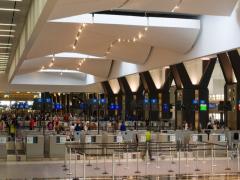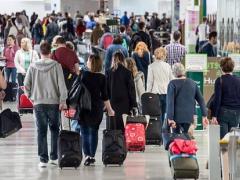Mileage Keeper Award was
capacity controlled and
excluded the fuel levy, which
was payable in cash. “It is
therefore not comparable with
the pricing of Dynamic Awards,
which are inclusive of fuel levy
in addition to being available
on any booking class for the
desired flight,” she says.
Suretha adds that the
changes to Voyager allow
more redemption options and
minimise the cash cost of
redemption. “The restriction on
the availability of SAA Voyager
seats and the requirement of
having to pay for the fuel levy
were SAA Voyager’s top two
customer complaints,” she
says.
“Within South Africa,
there are about 80 loyalty
programmes and the return
in ‘cash’ value based on the
rand value spend, equals
between 0,025 to 2,5%. We
are therefore immensely proud
that SAA Voyager’s return
equals 5%. In other words,
for R5 000 spent on SAAoperated
flights, a member
will have R250 to spend
towards future travel on
SAA-operated flights.”
Upgrades
A major benefit of the previous
Voyager system, agents say,
was that travellers could
confirm the upgrade of their
seats with Voyager miles up
to a year in advance. Under
the new system, upgrades can
only be confirmed 24 hours to
48 hours before the flight.
There will be instances when
SAA will know 48 hours prior
to departure that the potential
sale of seats at normal cost
will not be reached, says
Suretha, and therefore SAA
could confirm an E-Class
seat (i.e. seat allocation
for SAA Upgrade Awards).
“Members will know that the
mileage thresholds required
for Upgrade Awards do not in
the least relate to the price
in rands to upgrade from
economy class to business
class.”
SAA Voyager will have the
technology to implement
part payment (miles and
cash) for SAA-operated seats
within the next three to four
months, Suretha says. “This
will allow members to upgrade
dynamically from economy
class to business class for
immediate confirmation. The
mileage threshold required will
be higher.”REPORTS are circulating that some
expatriates with permanent residence
in South Africa are being stopped
at airports when travelling back into
the country and asked to produce
residence certificates.
There is a great deal of hearsay
surrounding the matter, says ceo of
Asata, Otto de Vries. “Some sources
say the ruling was already in place and
others say it came into effect from
January 1.”
Meanwhile, Home Affairs has failed
to respond to enquiries about the new
policy, leaving travellers in the dark.
The department did not respond to
numerous requests sent by TNW to
comment on the situation.
Immigration expert and director
for Intergate Immigration, Monya
Flier, says Home Affairs informally
announced a change in policy
more than six months ago. The
announcement stated that Home
Affairs would no longer issue
permanent residence stamps in
passports, requiring travellers to rely on
their permanent residence certificates.
Monya says the new policy was
implemented without notice or proper
communication – it was simply
displayed as a notice on the walls of
the Home Affairs building, she says.
For the moment, while Home Affairs
no longer issues residence stamps, it
seems travellers are allowed to use the
old stamps as a form of verification,
says Monya. “We have had no reported
incidents on this account yet
However, the issue remains
murky and travellers should
not rely on their old stamps
continuing to be accepted,
she says. “I strongly advise
permanent residents to
travel with their certificates.”
In situations where a
permanent resident tries to
re-enter South Africa without
proof of residence, officials
at the point of entry will
have every right to assess
that traveller as a temporary
visitor, says Monya. “For
non-visa-exempt individuals,
their immigration is highly
controlled. It is highly likely
that, should they fail to
produce the necessary proof,
they will not even be allowed
to board the plane.
“Also very worrying is
the fact that these stories
all relate to the original
certificate and not a copy,
which most travellers would
be uncomfortable travelling
with,” says Otto.
Monya adds that
permanent residence
certificates are not easy to
replace. “Historically, these
certificates have taken about
a year to replace by means
of a Proof of Permanent
Residence application.”
She, therefore, strongly
recommends that travellers
check with immigration
officials whether or not
they are able to travel with
a South African ID book
instead. “The notice didn’t
provide any clarity on
whether or not this would be
possible, however an ID book
is far easier to replace.”
Otto says the deafening
silence from Home Affairs
concerning clarification
around the issue is
perhaps an indication that
the department itself is
uncertain of the ins and outs
of the new policy. In general,
all the new changes around
South African immigration
policies have created
massive uncertainty, he
says. “Quite frankly this is a
mess.”












